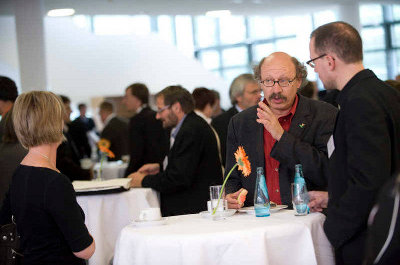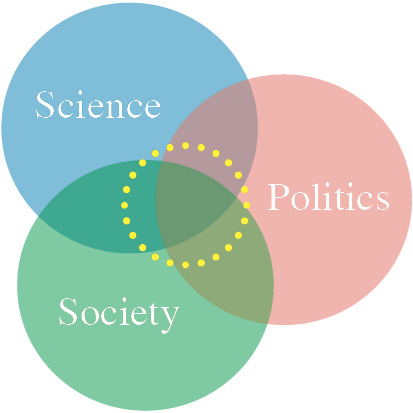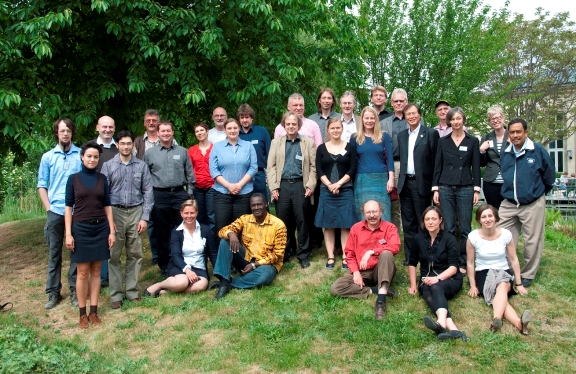Nested Networks:
International workshop
Helmholtz Centre for Environmental Research – UFZ
11-13 May 2011


Venue: UFZ – Centre for Environmental Research
Permoserstr. 15, D-04318 Leipzig, Germany

Background and Relevance
The main objective of this workshop is to discuss the major options on how to produce and govern global environmental assessments. The idea of this research project goes back to the IMoSeb workshop in October 2006 at Leipzig. At this workshop, a group of highly experienced scientists, practitioners, representatives of national and international institutions and civil society organisations agreed on recommendations on how to improve the relationship between scientists and policy-actors and called for a necessary turn away from a monolithic, centralized and hierarchical epistemic community to more pluralistic, decentralized and heterogeneous ways of interaction that we call nested networks. The Leipzig Recommendations constitute a major milestone in the consultations setting up a science-policy platform on biodiversity and ecosystem services by highlighting the specifics of such a mechanism with regard to its mandate, internal process as well as its outputs and outcomes.
The 2011 workshop aims at deepening these discussions. Since 2006, major developments have been taking place that highlight the relevance of such a discussion: 2010 has been a challenging period for the Intergovernmental Panel on Climate Change (IPCC) that had enjoyed a pristine reputation and had even advanced to become a role model for biodiversity and food security assessments. Efforts to establish an IPBES (Intergovernmental Science-Policy Platform on Biodiversity and Ecosystem Services), often called an ‘IPCC-like mechanism for biodiversity’, culminated in June 2010.
These events reveal the challenges involved in generating authoritative, policy-relevant knowledge in the context of global environmental politics. The IAC review of the IPCC demonstrates that the scientific assessment of a complex problem such as climate change or biodiversity loss is a tremendously difficult task: It involves thousands of people with different expertise, cultures, interests, and expectations. The available information is extensive, multidisciplinary, multinational and multicultural; extends across multiple spatial and temporal scales; is subject to different interpretations and has a wide range of uncertainties. The IAC also highlights that the magnitude and complexity of the assessment task has increased while the governance and management of such an endeavour have received very little attention. Not least because scientists are highly exposed to public scrutiny and work under the public microscope, assessments have to be responsive to the processes and structures in which scientific knowledge is validated for public use.
Workshop Goals
The workshop is envisaged as an important step to bring together high-level expertise both from key actors (including scientists participating in global assessments and representatives from “user institutions” like UNEP, national governments, stakeholder and civil society organisations and observers such as outstanding scholars from different disciplines and backgrounds. We intend to discuss experiences from the Intergovernmental Panel on Climate Change (IPCC), the Millennium Ecosystem Assessment (MA), the Intergovernmental Science-Policy Platform on Biodiversity and Ecosystem Services (IPBES), The Economics of Ecosystems and Biodiversity (TEEB) and the International Assessment of Agricultural Science and Technology Development (IAASTD).
Our workshop will focus on reconsidering what we have learned over the past years and how we can insert it into recent assessments and how to cope with future challenges. It aims at three different goals:
- To collect and summarize experiences about strength and weaknesses of former and existing arrangements.
- To discuss what general messages can be drawn for bridging the gap between science and policy at the global and other levels.
- To identify research gaps and hereby develop an agenda for future exchange.
The workshop conclusions thus surely will contribute to ongoing debates in different assessment bodies, including recent intergovernmental negotiations like the IPCC reform process and the establishment of the IPBES which will probably take place in autumn this year.
Workshop Issues/Potential Questions
Relevant issues are
- novel challenges like increasing complexities, uncertainties and contested values and questions of quality control for policy relevant knowledge
- integration of different kinds of knowledge (natural and social science, local and indigenous knowledge)
- political relevance, the functions and roles of scientific assessments in relation to politics (like the synthesis, translation and certification of scientific knowledge, monitoring of environmental performance and policy appraisal)
- potential addresses and “user” groups (like public administrations, stakeholders) and different forms of participation, representation and accountability
- tools which help to integrate research results like integrated models and scenarios that build a bridge between scientific disciplines (inter-disciplinary) and research and stakeholders (trans-disciplinary)
- cross-cutting and new emerging issues (like geo-engineering)
- procedures like the management of uncertainties and quality control for policy relevant information
Workshop Structure and Procedures
The objective of the workshop is to deepen the discussion on challenges and options for conducting international assessments. The workshop provides a forum to identify and analyse different features of scientific assessments while leaving room to discuss marginalised perspectives, focus on neglected issues, and identify a broad range of options and alternatives. The challenge, of course, will be to be open for additional perspectives and collegial interactions. Rather than directly generating recommendations, it aims to collect experiences about strength and weaknesses of existing arrangements, and to stimulate in-depth discussions about information needs, future challenges and options.
In order to make the discussion productive and responsive, we decided in favour of the following form and procedures:
- In order to be responsive to discussion needs of the participants, we will send a questionnaire to the participants and ask for a short, written statement with their experiences and views of the workshop’s central organizing questions and issues. The results will provide the input into the workshop agenda.
- The workshop will be organized around group discussions rather than formal presentations. The workshop consists of alternating different plenary discussions, followed by breakout groups.
- The timetable of the meeting is structured, but the topics to be discussed will be determined by the participants. The results of the questionnaire, to which we ask you to respond, will be presented at the first session of the workshop to open up the discussion and to identify topics to be addressed in the discussions of the breakout groups.
- The number of participants is limited, to ensure an open fluid and profound discussion.
- The workshop is conducted “off the record” and designed to allow maximum time for conversation and engagement. Held under the Chatham House Rule all participants speak from their personal experiences and not as a representative of an institution or organised group. Your comments will not be attributed outside the workshop.
The workshop will result in a short set of considerations that the participants feel should be taken into account. These considerations will summarize the discussions at the workshop and will be completed by its end. They will be supplemented by a more detailed workshop report to be circulated after the workshop.
Organizers
The workshop is part of the Research Project “Nested Networks – New Governance of Science by Global Environmental Networks”. It is funded by Federal Ministry of Education and Research (BMBF): “Research on the relationship between science, politics and society”.
About the UFZ
The Helmholtz Centre for Environmental Research (UFZ) is member of the Helmholtz Association of Research Centres whose mission consists in problem oriented research. Its approximately 948 scientists focus on environmental issues such as sustainable use of landscapes, biodiversity and ecosystem functioning under accelerated change, water management, soil contamination especially in heavily contaminated megasites, and chemicals in the environment.
Contact Information
Dr. Silke Beck
Helmholtz Centre
for Environmental Research - UFZ
Permoserstr. 15
04318 Leipzig, Germany
phone: ++49 - 341 - 235 1733
fax: ++49 - 341 - 235 1836
silke.beck@ufz.de
Homepage Silke Beck
